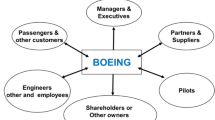Abstract
Whistle-blowing would appear to involve a conflict between employee loyalty and protection of public interest. Several business ethicists have, however, argued that this conflict is indeed merely apparent. According to the central argument to that effect, when the nature of employee loyalty is understood correctly, it becomes clear that whistle-blowing does not threaten employees’ loyalty to their employer. This is because blowing the whistle about one’s employer’s wrongdoing and being loyal to them serves the same goal, the moral good of the employer. In this article, I assess this philosophical argument for the conclusion that the moral problem of whistle-blowing is not real. I argue that the way of defending the view that whistle-blowing is not morally problematic is implausible.
Similar content being viewed by others
References
Baron M. (1991) The Moral Status of Loyalty. In D. G. Johnson (ed.) Ethical Issues in Engineering. Prentice Hall, Englewood Cliffs, NJ, pp. 225–240
Beauchamp, T. L., & Bowie, E. (2001) Ethical Theory and Business. Prentice Hall, Upper Saddle River, NJ
Boatright, J. R. 2003 Ethics and the Conduct of Business 4th Edition. Prentice Hall, Upper Saddle River, NJ
Christman, J. 2004 Relational Autonomy, Liberal Individualism, and the Social Constitution of Selves. Philosophical Studies 117(1–2), 143–164. doi:10.1023/B:PHIL.0000014532.56866.5c
Chryssides G. D., Kaler, J. (1996) Essentials of Business Ethics. McGraw-Hill, London
Corvino, J. 2002 Loyalty in Business?. Journal of Business Ethics 41(1–2), 179–185. doi:10.1023/A:1021370727220
De George, R. T. 2006 Business Ethics. Pearson/Prentice Hall, Upper Saddle River, NJ
DesJardins, J. R. and J. J. McCall: 1985, (eds.), Contemporary Issues in Business Ethics (Wardsworth, Belmont, CA)
Duska R. 1985 Whistle-Blowing and Employee Loyalty In: J. R. DesJardins, J. J. McCall (eds.) Contemporary Issues in Business Ethics (Wardsworth, Belmont, CA), pp. 295–300
Ewin, R. E. 1992 Loyalty and Virtues. The Philosophical Quarterly 42(169), 403–419. doi:10.2307/2220283
Hajdin, M. 2005 Employee Loyalty: An Examination. Journal of Business Ethics 59(3), 259–280. doi:10.1007/s10551-005-3438-4
Hooker B. 1998 Does Moral Virtue Constitute a Benefit to the Agent In R. Crisp (ed.) How Should one Live? Oxford University Press, New York, NY, pp. 141–156
Hurka T. 1996 Perfectionism. Oxford University Press, New York, NY
James G. G. 1991 Whistle-Blowing: Its Moral Justification. In: D. G. Johnson (ed.) Ethical Issues in Engineering (Prentice Hall, Englewood Cliffs, NJ), pp. 263–278
Jubb, P. B. 1999 Whistleblowing: A Restrictive Definition and Interpretation. Journal of Business Ethics 21(1), 77–94. doi:10.1023/A:1005922701763
Ladd, J.: 1967, ‹Loyalty’, in Encyclopedia of Philosophy, Vol. V (MacMillan, New York, NY), pp. 97–98.
Larmer, R. A. 1992 Whistleblowing and Employee Loyalty. Journal of Business Ethics 11(2), 125–128. doi:10.1007/BF00872319
Martin M. W., Schinzinger R. 2005 Ethics in Engineering. 4th Edition. (McGrawHill, New York, NY)
Mele, D. 2001 Loyalty in Business: Subversive Doctrine or Real Need?. Business Ethics Quarterly 11(1), 11–26. doi:10.2307/3857866
Near, J. P., Micheli, M. P. 1985 Organizational Dissidence: The Case of Whistle-Blowing. Journal of Business Ethics 4(1), 1–16. doi:10.1007/BF00382668
Oldenqvist, A. 1982 Loyalties. The Journal of Philosophy LXXIX(4), 173–193. doi:10.2307/2026219
Oshana, M. L. A. 2001 The Autonomy Bogeyman. The Journal of Value Inquiry 35(2), 209–226. doi:10.1023/A:1010345019890
Oshana, M. L. A. 2002 The Misguided Marriage of Responsibility and Autonomy. Journal of Ethics 6(3), 261–280. doi:10.1023/A:1019482607923
Parfit, D. 1984 Reasons and Persons. (Clarendon Press, Oxford)
Royce, J. 1908 The Philosophy of Loyalty. (MacMillan, New York, NY)
Stieb, J. A. 2006 Clearing Up the Egoist Difficulty with Loyalty. Journal of Business Ethics 63(1), 75–87. doi:10.1007/s10551-005-0847-3
Vandekerckhove, W., & Commers, M. S. R. 2004 Whistle Blowing and Rational Loyalty. Journal of Business Ethics 53(1–2), 225–233. doi:10.1023/B:BUSI.0000039411.11986.6b
Author information
Authors and Affiliations
Corresponding author
Rights and permissions
About this article
Cite this article
Varelius, J. Is Whistle-blowing Compatible with Employee Loyalty?. J Bus Ethics 85, 263–275 (2009). https://doi.org/10.1007/s10551-008-9769-1
Received:
Accepted:
Published:
Issue Date:
DOI: https://doi.org/10.1007/s10551-008-9769-1




